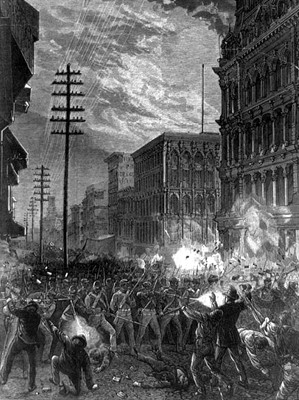During the last two weeks of July 1877 a series of railroad strikes erupted after railroad managers tried to reduce wages that were already low. "The strike is a result of desperation," labor leader
J. P. McDonnell explained. "There was no concerted action at the start. It spread because the workmen of Pittsburgh felt the same oppression that was felt by the workmen of West Virginia." After local police, state militia, and federal troops clashed with strikers in Baltimore, Pittsburgh, Martinsburg, W.Va., and other cities, railroad workers and sympathizers organized mass meetings to support the strike, action that helped push the labor movement forward. Although the strike was ultimately lost, it was a turning point in American labor history. "The railroad strike of 1877," as Samuel Gompers put it, "was the tocsin that sounded a ringing message of hope to us all."
